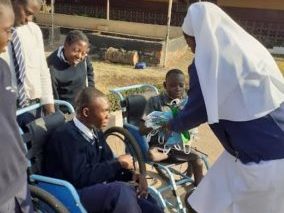Why Religious Sisters?
Stand in solidarity with African SistersSisters are leaders.
Religious women are key healthcare providers, educators, and counselors in sub-Saharan Africa. More than that, Sisters are key pastoral ministers in the communities where they serve, offering spiritual guidance and support.
Given our leadership position, Sisters can offer unique advantages in alleviating the stigma and suffering associated with HIV/AIDS and more recently, COVID-19.
Trust. With their education and spiritual grounding, women religious speak knowledgeably—and compassionately—about HIV/AIDS. They also understand that the conditions of extreme poverty and certain cultural norms can contribute to the incidence of HIV/AIDS. Our Sisters are trained to help people overcome the fear and social stigma associated with the disease. As trust builds, more people are willing to be tested and treated, and new rates of infection go down.


Empathy. In the sub-Sahara, women and girls comprise 56% of new HIV/AIDS infections among those age 15 and older. They are more readily stigmatized than men, and bear a disproportionate share of the HIV/AIDS burden because they are both vulnerable to infection, and usually serve as the primary caregivers for those who are already infected.
Given the burden they carry and the culture of fear, women are more comfortable discussing their healthcare needs with other women. Sister to Sister gives women religious the tools to be empathetic listeners, especially on behalf of those who lack hope and a voice of their own. Our Sisters are highly regarded in sub-Saharan cultures for trust, empathy, and compassion.
Support. Sisters are also leaders because they are committed to a supportive Sister to Sister network. Over the years, Conference members have developed ways of sharing information as well as spiritual support. This network sustains their work, often times under difficult conditions, especially when Sisters are grieving themselves over the loss of a loved one to HIV/AIDS and more recently, COVID-19.

